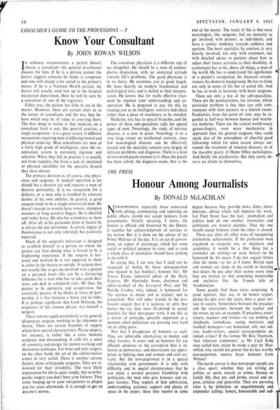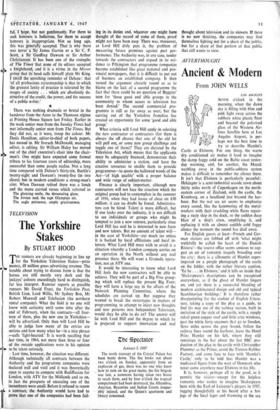Honour Among Journalists
THE PRESS
By DONALD McLACHLAN
NEWSPAPERMEN, especially those concerned with editing, commenting and reporting on public affairs, should not accept honours from governments. Strictly speaking, I know, the honour is offered and bestowed by the Queen; it signifies her acknowledgment of services to the nation. But it is done on the advice of the Prime Minister of the day. It is an act of govern- ment, an aspect of patronage, which has some social or political purpose in view; and as such a whole class of journalists should have nothing to do with it.
In saying this, I am sure that I shall not be suspected of malice by those newspapermen who figured in last Sunday's honours list : Mr Trevor Evans, industrial editor of the Daily Express, Mr Alexander Jeans, chairman and editor-in-chief of the Liverpool Post, and Mr Neville Cardus, who, indeed, is honoured for 'his services to music and to cricket,' not to journalism. Nor will other friends in the pro- fession suspect that it is jealousy or spite that makes me say they were ill-advised to accept honours for their newspaper work. I see this as a matter of principle, specially important at a moment when politicians are pressing very hard on an ailing press.
Not that I disapprove of honours as such. They are admirable alternatives to money and other favours. A court and an honours list are efficient antidotes to the corruption that is in- herent in democracy; and decorations are appro- priate to fighting men and women and civil ser- vants. But the newspaperman is in a special relationship with government. It is only with difficulty and in special circumstances that he can enjoy a normal personal friendship with politicians, the men who give honours and ex- pect favours. They require of him admiration, understanding, patience, support and plenty of space in the paper; these they receive in some degree because they provide news, hints, intro- ductions, advice which will improve his work. Let Fleet Street face the fact: journalism and politics feed on one another. Journalists and politicians are natural enemies. That the one should accept honours from the other is absurd.
There are, after all, other ways of recognising journalistic achievement. If the profession were organised as surgeons are, or engineers and academics, it would be a fine thing for a journalist on retiring—or even before—to be honoured by his peers. I do not suggest letters after his name—so far as I know, British men and women are alone in the world in insisting that letters be put after their names every time they are written to—but something memorable and exclusive like the French title of Academician.
Some people find these views surprising. A good reporter, they say, or an honest arguer, plying his pen over the years, does a great ser- vice to society. Somewhere between the preacher and the entertainer, between the teacher and the writer, he sets an example. If preachers, enter- tainers, teachers and writers—to say nothing of shepherds, comedians, racing motorists and football managers—are honoured, why not edi- tors, leader-writers, special correspondents or, indeed, critics? If the former Mr Roy Thomson, that reluctant commoner,' as Mr Cecil Kisig once called him, might be made a peer by Mac- millan, why should not poorer but no less worthy newspapermen receive lesser honours from Wilson?
The harsh answer is that newspaper people are a class apart; whether they are writing on politics or sport, morals or crime, finance or family life, they pry and probe, reveal and ex- pose, criticise and generalise. They are pursuing what is by definition an ungentlemanly and unpopular calling; honest, honourable and usi-
ful, I hope, but not gentlemanly. For them to seek honours is ludicrous, for them to accept honours is inappropriate. Not so long ago, this was generally accepted. That is why there was never' a Sir James Garvin or a Sir• C. P. Scott, a Sir Geoffrey Dawson or Sir Arthur Christiansen. It has been one of the strengths of l'he Times that none of its editors accepted a knighthood, and it is a virtue in the Mirror gronp that its head calls himself plain Mr King. I twill the scorching' reminder of Delane: that 'of all professions statesmanship is that in which the greatest laxity of practice is tolerated by the usages of society . . . which are absolutely de- structive of the credit, the power, and the success of a public writer.'
There was nothing dramatic or brutal in the handover from the Astor to the Thomson regime at Printing House Square last Friday. Earlier in the week senior men from the Sunday Times had met informally senior men from The'Times. But they did not, as it were, troop the colour. Mr Denis Hamilton, editor-in-chief of both papers, his moved in. Mr Iverach McDonald, managing editor, is editing. Sir William Haley has moved out of the chief executive's chair into the chair- man's. One might have expected some formal tribute to his fourteen years of editorship, more successful than some people realise. Not a long time compared with Delane's thirty-six, Buckle's twenty-eight and Dawson's twenty-five (in two slices); but in modern conditions a strong-man's stint When Dawson retired there was a lunch and the menu carried verses which referred to The glancing smile, the devastating glare, The Jovian nod, the rapt Olympian air, The eagle puissance, ample graciousness.































 Previous page
Previous page